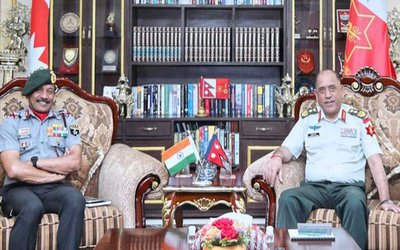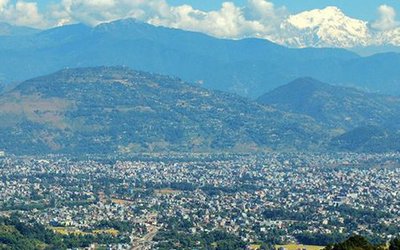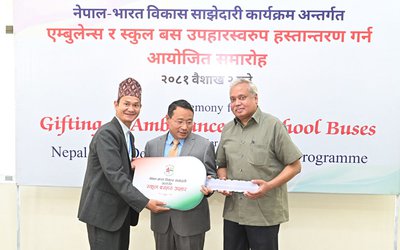The armed struggle of Nepal, starting from 1996, formally ceased after signing the Comprehensive Peace Agreement between the Interim Nepal Government and the Nepal Communist Party Maoist, on 21 November, 2006. This peace accord is also a part of the Interim Constitution and under this Constitution the provision is that truth and reconciliation and commission of inquiry on disappearances will be formed to address the issues related to human rights violations and cases of forced-disappearances that took place during the time of Maoist Insurgency.
To in line with this provision, as part of the permanent peace process, the Government of Nepal brought two separate Bills related to the Truth and Reconciliation Commission (TRC) and Commission of Inquiry on Disappearances (CID) more than 2 years ago. But now, the main political parties have agreed to form an integrated reconciliatory commission to address such issues. So, a formal letter on behalf of the Government has been received in Parliament to withdraw these bills. But as the Parliament meeting is yet to convene; they are pending now. After withdrawing these bills; it is said that a combined new bill will be registered again.
It has been about 5 years since the end of Maoist Insurgency but the victims of both sides (from state and rebels) are anxiously waiting for justice and appropriate reparation for lost lives and properties. In such a situation, what would be the cause behind withdrawing the bills and why did the government not pay appropriate attention to whether those bills should have come separately or in a unified manner back then?
This article deals with the three core things: the main subject matter of these bills, their present conditions under Parliamentary business and the decision recently made by major political parties about forming an integrated reconciliation commission.
Among of two bills, the first deals with the Truth and Reconciliation Commission. This bill aims to find out the factual truth about the violation of rights as a heinous crime committed against humanity and punish the persons involved in such crimes, to do away with the impunity and ensure no repeated of such incidents happens in the future. Likewise, it seeks to preserve the right of victims to get reparation and to provide reparation and due respect on behalf of the State and to create good faith and social harmony reconciling between victims and perpetrators. For these purposes, the bill has a provision to form an independent and impartial commission comprising 7 members, including a chairperson. These presiding officials are appointed by the Government according to recommendation of a committee to be formed for this purpose and chaired by the Speaker of the parliament and having two other members; one from Human Rights Commission and other Specialist from the related field. The Commission has rights like a court to take inquiry on such incidents under its area as notices come through personal complaints or public hearing.
Besides this, the Commission can make reconciliation between the victims and perpetrators on the ground of repentance, reparation and compensation. Similarly the Commission has the right to recommend to the Government for granting general amnesty to such rights' violators with the consent of victims. However, the 5 cases; murder in captivity, murder of unarmed persons, torture, rape, forced-disappearance of a person and abduction or captivity of person are out of granting general amnesty. A proven wrongdoer of these 5 cases, not to have been reconciled or not recommended for granting general amnesty, is recommended to the Government to take punitive action through the Attorney General. There is also the provision that the Commission's report with recommendation to have been executed or not is scrutinized by the National Human Rights Commission.
Similarly, another bill related to the forced-disappearance of humans aims to punish those who commit such forced-disappearances of humans, to define such deeds as heinous crimes, to provide reparation to victims and to find out the factual truths and facts about forcefully-disappeared person and the person involved in such activities during Maoist insurgency. For this purpose Nepal Government can form an independent and impartial Commission having 5 members in the same way and process as the Truth and Reconciliatory Commission as enumerated above.
The fundamental differences between these two bills are; the later one focuses only on forced-disappearance of humans and can't make reconciliation between victims and perpetrators and it looks to be established as permanent law in that field while the Truth and Reconciliation Commission can be terminated after finishing its business.
These bills were registered at the Parliament Secretariat at the end of 2009. Discussions started in the Legislation Committee since 13 April, 2011 and a subcommittee was also formed which studied the more debatable issues of both bills raised in the course of discussion. There are more than 80 recommendations for amendment of each bill. Sub-Committee members were divided into two groups, one wanted to have severe punishment, provisions in both bills but the other wanted to lose sanctions in the case of truth finding and reconciliation. Besides this, the more debatable issue was about the grounds of granting general amnesty, which could not be passed.
In conclusion, to get the State Powers is only possible through struggle. The means of struggle are public and they only can be mobilized if they are convinced to get something more than they are enjoying at present. So, politicians share to them sweet assurances and dreams to go in power because assurances and dreams are always free of cost and they depend on only the skills of sharing them. But, when leaders come into power and public ask them about their dreams; then, leaders startle and always seek the smooth way how to dodge from fulfilling the impossible promises they made. Then, they follow the ways of redefining the circumstances, turn aside from main course and linger on their responsibilities. This is the universal fact. Now, the victims, Human Rights Activists and some lawmakers also are looking at it with suspicious eyes that after withdrawing these bills, whether a unified bill would again come or not. If so, the sufferers and victims will never get justice and impunity will remain forever.
(Buidhathoki is under secretary at Constituent Assembly Secretariat)
- TANAHU HYDROPOWER PROEJCT: A Significant Achievement
- Apr 15, 2024
- AMBASSADOR HANAN GODAR: Sharing Pain With A Nepali Family
- Mar 30, 2024
- VISIT OF KfW AND EIB TO NEPAL : Mission Matters
- Mar 25, 2024
- NEPAL BRITAIN SOCIETY: Pratima Pande's Leadership
- Mar 24, 2024
- NEPAL ARMY DAY: Time To Recall Glory
- Mar 15, 2024
















